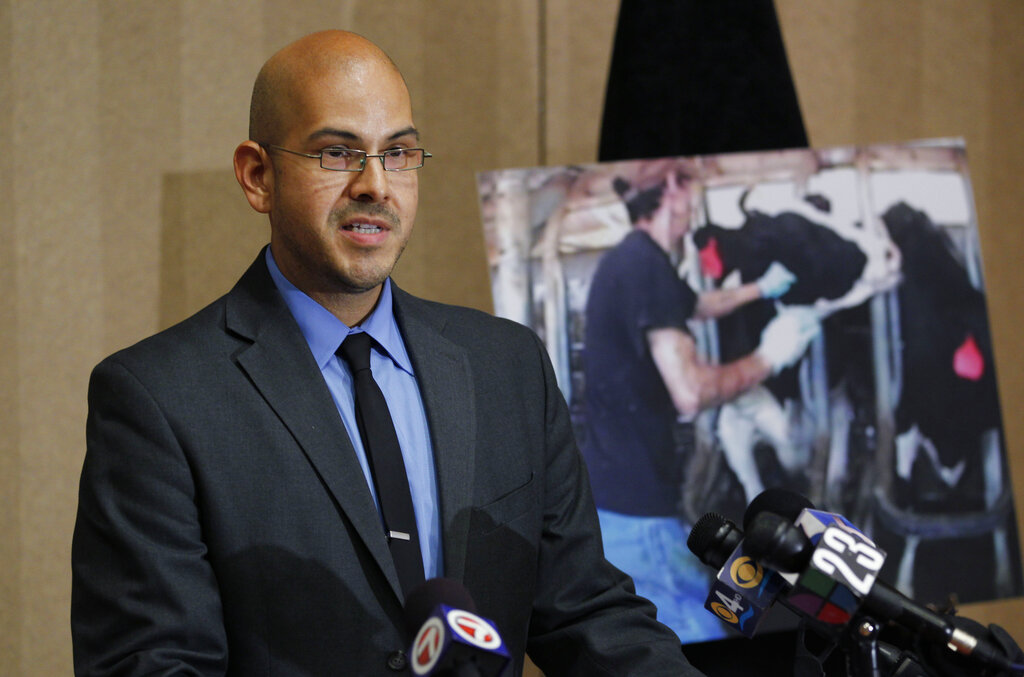Laws that seek to block animal rights activists and others from recording or otherwise documenting alleged abuses of animals or animal cruelty in the agriculture industry, often as part of undercover investigations, are referred to as ag-gag laws.
Defenders of the laws contend they are necessary to protect agricultural property, business operations and privacy. Detractors say the laws are designed to silence legitimate criticism of unsavory practices that the agricultural industry would rather keep secret.
The laws have their origins in the early 1990s when at least three states — Kansas, Montana and North Dakota — passed “ecoterrorism” or “agroterrorism” laws that were designed to deter animal rights activists from trespassing and causing property damage. They also contained provisions that banned recording of their operations.
Laws after 2011 focused more on banning recordings to try to reduce economic damage from publicity and on criminalizing misrepresentation of an individual who gained employment at an industrial farm with the aim of documenting its operations.
9th Circuit: Idaho ag-gag law violates free speech rights
Certain provisions of ag-gag laws have been struck down by federal courts as violating free speech protections in the First Amendment.
For example, Idaho passed the Agricultural Production Law after a video was released showing the mishandling of cows on an Idaho dairy farm. Idaho’s law created the crime of interference with agricultural production. It prohibited a person from entering an agricultural facility by “force, threat, misrepresentation, or trespass.” It also prohibited obtaining records of an agricultural facility by “force, threat, misrepresentation, or trespass.”
Another provision prohibited someone from obtaining employment with an agricultural facility “by force, threat, or misrepresentation with the intent to cause economic or other injury” to the agricultural facility. Finally, the law prohibited entering an agricultural facility not open to the public without consent and making an audio or visual recording of the premises.
The Animal Legal Defense Fund challenged several provisions of the Idaho law, particularly those that prohibited accessing the premises through misrepresentation, as a violation of the First Amendment right to gather news and engage in investigative journalism. The 9th U.S. Circuit Court of Appeals ruled in Animal Legal Defense Fund v. Wasden (9th Cir. 2018) that the prohibition on accessing agricultural property by misrepresentation burdened too much speech under the U.S. Supreme Court’s reasoning in United States v. Alvarez (2012). The court in the Alverez case invalidated the Stolen Valor Act, which had criminalized lying about receiving military honors.
The 9th Circuit also invalidated the part of Idaho’s law that prohibited making recordings – audio or visual – of the agricultural facilities. The appeals court said that the recordings clause was both under-inclusive and over-inclusive. “Prohibiting only ‘audio or visual recordings’, but saying nothing about photographs, is suspiciously underinclusive,” the 9th Circuit wrote. “The Recordings Clause is also over-inclusive and suppresses more speech than necessary to further Idaho’s stated goals of protecting property and privacy.”
4th Circuit invalidates parts of North Carolina’s ag-gag law
In another case in 2023, the 4th U.S. Circuit Court of Appeals invalidated several provisions of a North Carolina law – called the Property Protection Act – that broadly sought to punish any person that “intentionally gains access to the non-public areas of another’s premises and engages in an act that exceeds the person’s authority to enter.”
The North Carolina legislature passed the law to build upon a 1999 decision by the 4th Circuit in Food Lion, Inc. v. Cap. Cities/ABC Inc., 194 F.3d 505 (4th Cir. 1999), which said that the First Amendment does not protect journalists who lie on employment applications to gain access to private facilities for news gathering practices and that such individuals may be liable for trespass or other offenses. In that case, two ABC News reporters got jobs at Food Lion stores by misrepresenting their work history, then proceeded to document unsanitary food handling practices using hidden cameras. The footage was used in a story aired by the news network.
The North Carolina law identified acts that exceeded a person’s authority to enter nonpublic areas of another’s premises as entering an employer’s premises and capturing employer data, papers, records or any other other documents and using the information to breach the person’s duty of loyalty to the employer; an employee recording images or sounds at the employer’s place of business to breach the person’s duty of loyalty; knowing placement of a surveillance device on the property to breach the person’s duty of loyalty; and committing an act that “substantially interferes with the ownership or possession of real property.”
The People’s Ethical Treatment for Animals (PETA) challenged these four provisions of the law as a targeted attack on investigative journalism and protected whistleblowing. The 4th Circuit found that several of these provisions target speech critical of employers and they “enact novel restrictions on newsgathering.” It enjoined enforcement of the law to newsgathering activities, saying: “For our purposes, it suffices to hold only that recording in the employer’s nonpublic areas as part of newsgathering constitutes protected speech.”
The North Carolina Farm Bureau sought certiorari review from the U.S. Supreme Court, but the U.S. Supreme Court denied review on Oct. 16, 2023.
While the Supreme Court did not take this particular case, at some point the U.S. Supreme Court may well have to wade into these troubled waters to determine the constitutionality or unconstitutionality of aspects of these so called ag-gag laws.
David L. Hudson, Jr. is a law professor at Belmont who publishes widely on First Amendment topics. He is the author of a 12-lecture audio course on the First Amendment entitled Freedom of Speech: Understanding the First Amendment (Now You Know Media, 2018). He also is the author of many First Amendment books, including The First Amendment: Freedom of Speech (Thomson Reuters, 2012) and Freedom of Speech: Documents Decoded (ABC-CLIO, 2017). This article was originally published in 2009.

